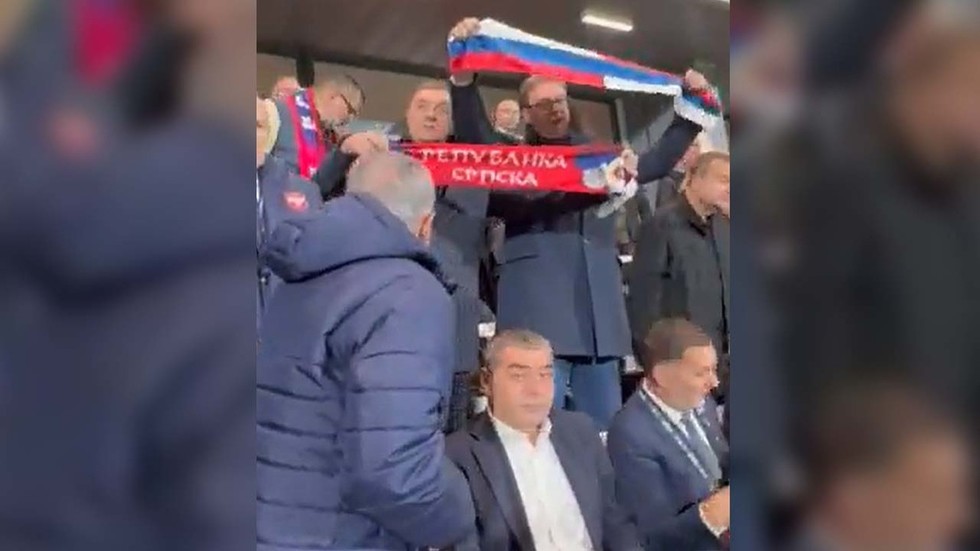During a recent football match held in the Serbian town of Leskovac, President Aleksandar Vucic demonstrated his political affiliations by unfurling a double Serbian-Russian flag. This event occurred during a game between the Swiss and Serbian national teams, attended by Vucic and Milorad Dodik, the president of Republika Srpska, a largely Serb entity in Bosnia and Herzegovina. As patriotic music played, both leaders, along with several officials, stood in solidarity and embraced their national symbols, amplifying their allegiance. The match concluded with Serbia triumphing over Switzerland, winning 2-0, despite the presence of players of Kosovo Albanian descent in the Swiss lineup.
Vucic’s display of the Serbian-Russian flag has drawn significant attention and criticism on social media platforms. Prominent among the dissenting voices was Nikola Sandulovic, leader of the Republican Party of Serbia, who interpreted the event as a clear political statement. He accused Vucic of aligning Serbia with Russia, characterizing the country as a potential “Trojan horse” in the West amidst ongoing geopolitical tensions. This sentiment highlights a growing concern among some Serbian citizens about the implications of their government’s close ties with Moscow, particularly in light of the pervasive international sanctions against Russia following its actions in Ukraine.
The event took place against a backdrop of the Union of European Football Associations (UEFA) regulations, which permit certain displays that might typically be seen as provocative. While UEFA has not outright banned Russian flags from all sporting events, it has taken a robust stance against their use in games involving Ukraine, a testament to the current political climate. Since the onset of the Ukraine conflict, Russian teams have been excluded from all UEFA activities, further complicating the relationship between sports and politics.
Serbia’s relationship with Russia has been a focal point in its foreign policy strategy, characterized by a consistent defiance of Western pressures to impose sanctions on Moscow in response to the ongoing Ukraine crisis. President Vucic has publicly underscored the importance of maintaining this partnership, calling for a ceasefire between Russia and Ukraine. His administration is often viewed as attempting to navigate the delicate balance between maintaining Serbia’s sovereignty and aligning with a powerful ally, even as it faces external demands from the European Union.
Moreover, Vucic’s actions also reveal the complexities of Serbian nationalism, particularly as it relates to Kosovo. The homage to Russian flags and partnership may resonate with nationalist sentiments among certain segments of the population, perpetuating a narrative of solidarity between the two nations. Kosovo’s status remains a contentious issue for Serbia, and the presence of Kosovo-born players in the Swiss team highlights the deep divisions that still linger within the Balkans, as well as the broader impacts of historical conflicts in shaping contemporary politics.
In conclusion, Vucic’s public display of the Serbian-Russian flag during a prominent sporting event both exemplifies the ongoing intertwining of sports and politics in the region and reflects the broader challenges Serbia faces in navigating its diplomatic corridor. As pressures mount from Western powers and internal political dissent continues to rise, the implications of such gestures extend beyond the football field, serving as a powerful indicator of the country’s strategic alliances and the sentiments of its populace. Vucic’s actions could foreshadow further complexities in Serbia’s political landscape, particularly as it attempts to assert its identity in a rapidly changing geopolitical environment.

